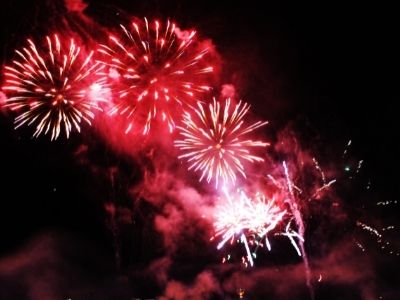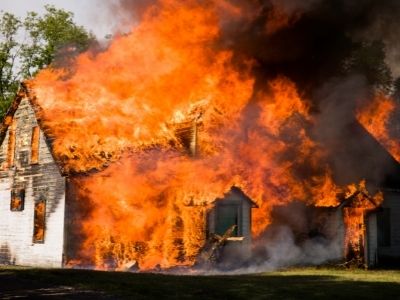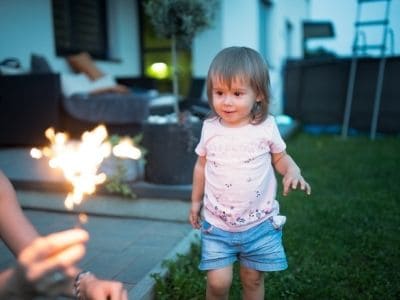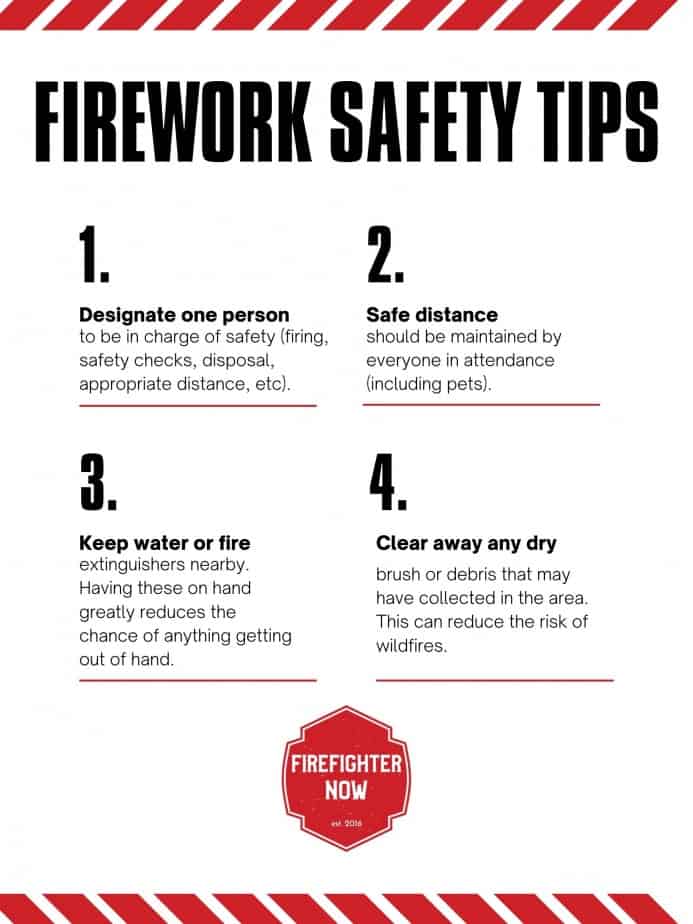Fireworks are one of the great joys in life as we watch beautiful aerial displays. However, fireworks can also be dangerous in the wrong hands. So, are fireworks a fire hazard and if so, how dangerous are they and what can do to reduce the risks?

Fireworks can cause fires because of the risks surrounding their use and the sparks created. In fact, fire services across the US deal with a surprising number of firework-related fires each year. The nature of these fires can vary depending on the situation, but they are highly dangerous and can lead to fatalities.
That is why it is so important to understand and practice proper firework safety to prevent firework fires and injuries as best you can.
Table of Contents
Why do fireworks cause fires?
You might expect fireworks to be pretty safe for use when handled correctly if they are available commercially. You light the firework, give it time to react, watch the projectile shoot into the sky, and enjoy the pretty colors.
However, there are lots of combustible materials at play, as well as high levels of heat and unpredictable sparks. Fireworks are all about explosive and volatile chemical reactions and the more complex the rocket, the bigger the risk.
The sparks alone from these fireworks can ignite flammable materials if set up in an unsafe location.
How many fires are firework-related?
There are more firework-related fires in the US than you would expect from such a novelty item. The problem is that the legal commercial sale of fireworks puts them in the hands of pretty much anyone. Also, kids can easily get hold of them illegally.
The NFPA reports that in 2018 alone, 19,500 reported fires were the result of fireworks. This lead to 46 civilian injuries, five deaths, and $105 million in property damage. Those deaths could come down to burns, smoke inhalation, or injuries from structural collapse.
What kinds of fires are fireworks responsible for?
Firework fires come in many different forms depending on who set them off and where. The most common form is wildfire. 59% of firework-related fires between 2014-2018 were brush, grass, or forest fires.

These are often accidental, as users either set off their fireworks too close to vegetation and trees, or they leave spent fireworks behind on dry grass.
It is a lot like tossing a lit cigarette out of a car window. You may think it is out and harmless but it could still catch combustible material and lead to a massive fire.
Many wildfires start from pretty small sources and cause massive damage and risks to life and property as a result.
Of the other firework-related fires, 9% were structure fires where fireworks set buildings alight. There are also cases of vehicle fires, which could be either accidental or deliberate. Rogue fireworks could hit cars or people could fire rockets at them.
How do fireworks cause structure fires?
There are a few ways that this can happen. The first is that families decide to light fireworks on their property, such as in the yard, and aren’t far enough away from the home.
Fireworks that shoot off in the wrong direction could hit a house or outbuilding and start a fire that way. There is also the risk of any outdoor fires from combustible vegetation spreading to the home.
Sadly, there are also rare cases of people deliberately setting fireworks off inside or close to people’s homes.

This could be a prank or a more malicious attack. In some cases, the culprit may not realize the fire risk that comes from putting fireworks through doors and windows and may just be out to scare someone.
But, the heat and sparks from the explosion can quickly ignite carpets and drapes, leading to dangerous house fires. Of the 46 civilian injuries in 2018 from firework fires, 74% of those were structure fires.
Then there is the risk of firework fire through improper storage. If you buy a set of fireworks for a big celebration. You need to be sure that they are in a secure location where there are no fire risks.
You may have seen footage online of the scale of the infernos and explosions that occur when fireworks storage facilities and factories catch fire.
An accidental fire from faulty electrics or flammable materials in a garage could be even more devastating if there are fireworks in there. Keep the fireworks somewhere safe and buy them as close to the occasion as possible.
Why don’t you see more fires at professional displays?
You may wonder why there aren’t more fires at professional displays if fireworks are so dangerous. The reality is that there are more fires than you realize, you just probably won’t see them or be alerted to them.
It isn’t uncommon for sparks from fireworks at displays to fall down to the landing site and ignite the empty tubes and other materials.
But, the team at the site will be prepared for this and put out small fires quickly and effectively. The launch site could be so far from public view that you don’t realize.
Can sparklers cause fires?
This is an important question often overlooked when it comes to fire safety. We often give children sparklers as a form of entertainment and assume they are perfectly safe if kids wear gloves. However, they are very dangerous.
Sparklers can burn at 2000 degrees to create those bright lights and sparks. This is hot enough to ignite flammable material and cause burns if you aren’t careful with them.

In fact, 25% of fireworks-based emergency room visits are sparkler-related. Children must stand well away from other people and combustible elements when playing with sparklers.
Make sure that the sparkler is out fully and cool before disposing of it. Don’t put it in the trash with the packaging as the heat or any sparks could cause a fire.
Also, make sure that kids don’t just toss the spent sparklers away if using them outside. They could catch dry leaves or other material and start a fire that way.
Do fire crews deal with more firework-related fires on the Fourth of July?
There is a strong relationship between fireworks and the Fourth of July. It is tradition for families to either attend fireworks displays or set off some rockets of their own to commemorate the nation’s independence.
The problem is that with such a rise in firework sales and the risk of improper use at parties, there is also a higher risk of firework fires. 28% of firework fires in that 2014-2018 period mentioned before began on the Fourth of July.
Another way of looking at this date is that 49% of fires reported on that date were due to fireworks. It is clear that fireworks are a massive health and safety concern.
How can you prevent firework fires at home?
It is essential that we all follow the correct safety precautions when using fireworks at personal displays and at home.
First of all, make sure that there is one responsible adult in charge of the firing, safety checks, and disposal.
Make sure that all other family members, especially children and animals are a safe distance away. This means keeping dogs and cats indoors where they won’t become distressed.

Second, you need to make sure to stay well clear of property and people and in a clearing away from any trees. Go to the middle of a field on your land or out somewhere that doesn’t require a permit.
Keep everyone at a distance and retreat yourself when you have lit the firework. Don’t return to it if you think it hasn’t lit properly just in case it is slower to ignite than you expect.
Finally, be careful at all times with flammable materials and containers near the launch site. Keep any packaging well away from the launch site to avoid the risk of fires from sparks. Also, make sure to have water nearby for extinguishing and disposing of fireworks.
Should we leave fireworks to the professionals?
This is the best advice if you want to celebrate a special occasion with fireworks. There are plenty of trained professionals that know how to set up a stunning display with minimal risks.
There may be small fires, but they won’t lead to the same massive wildfires, injuries, or property damage. Make the most of these events instead of worrying about setting up one or two rockets in your own yard.
The health and safety risks aren’t worth the expense or effort when free public events are so much more fun.
Firework fires are common but avoidable.
There are two key takeaways here when it comes to firework fires.
The first is that the risk of fire is greater than you expect because of the dangerous materials and reactions involved. Improper use can lead to wildfires, house fires, and more with severe consequences. The prevalence increases significantly on the Fourth of July.
The second is that you can reduce the risks by understanding firework safety or, better yet, declining to use commercial fireworks and only attending professional displays.